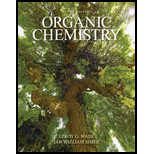
Organic Chemistry (9th Edition)
9th Edition
ISBN: 9780321971371
Author: Leroy G. Wade, Jan W. Simek
Publisher: PEARSON
expand_more
expand_more
format_list_bulleted
Concept explainers
Textbook Question
Chapter 17.15C, Problem 17.38P
- a. Based on what you know about the relative stabilities of alkyl cations and benzylic cations, predict the product of addition of HBr to 1-phenylpropene.
- b. Propose a mechanism for this reaction.
- c. Based on what you know about the relative stabilities of alkyl radicals and benzylic radicals, predict the product of addition of HBr to 1-phenylpropene in the presence of a free-radical initiator.
- d. Propose a mechanism for this reaction.
Expert Solution & Answer
Want to see the full answer?
Check out a sample textbook solution
Students have asked these similar questions
A unit used in photochemistry is the einstein. If 400 kJ mol-1 of energy has been absorbed, how many einsteins is this equivalent to?
For the condensation reaction between Alanine and histidine write the amididation reaction mechanism using arrows then write the three letter code for the product of the reaction and the one letter code for the product of the reaction.
Write the amididation reaction mechanism of p-aminophenol and acetic acid to produce acetaminophen please use arrows.
Chapter 17 Solutions
Organic Chemistry (9th Edition)
Ch. 17.1 - Prob. 17.1PCh. 17.2 - Prob. 17.2PCh. 17.3 - Prob. 17.3PCh. 17.4 - Use resonance forms to show that the dipolar sigma...Ch. 17.6A - Prob. 17.5PCh. 17.6A - Prob. 17.6PCh. 17.6B - Propose a mechanism for the brommation of...Ch. 17.6B - Prob. 17.8PCh. 17.6B - Prob. 17.9PCh. 17.7 - Prob. 17.10P
Ch. 17.8 - Draw all the resonance forms of the sigma complex...Ch. 17.9 - Predict the mononitration products of the...Ch. 17.9 - Predict the mononitration products of the...Ch. 17.9 - Prob. 17.14PCh. 17.10 - Propose products (if any) and mechanisms for the...Ch. 17.10 - Predict the products (if any) of the following...Ch. 17.10 - Which reactions will produce the desired product...Ch. 17.10 - Prob. 17.19PCh. 17.11C - Prob. 17.20PCh. 17.12A - Prob. 17.21PCh. 17.12B - Propose a mechanism that shows why p-chlorotoluene...Ch. 17.12B - Propose mechanisms and show the expected products...Ch. 17.12B - Prob. 17.24PCh. 17.13A - What products would you expect from the following...Ch. 17.13A - What organocuprate reagent would you use for the...Ch. 17.13B - What products would you expect from the following...Ch. 17.13B - Prob. 17.28PCh. 17.13C - What products would you expect from the following...Ch. 17.13C - Prob. 17.30PCh. 17.14C - Prob. 17.31PCh. 17.14C - Predict the major products of the following...Ch. 17.15A - Predict the major products of treating the...Ch. 17.15B - Prob. 17.34PCh. 17.15B - Prob. 17.35PCh. 17.15B - Predict the major products when the following...Ch. 17.15C - Prob. 17.37PCh. 17.15C - a. Based on what you know about the relative...Ch. 17.15C - Show how you would synthesize the following...Ch. 17.16A - The bombardier beetle defends itself by spraying a...Ch. 17.16B - Predict the products formed when m-cresol...Ch. 17.16B - Prob. 17.42PCh. 17.16B - Prob. 17.43PCh. 17.16B - Predict the site(s) of electophilic attack on...Ch. 17.16B - Prob. 17.45PCh. 17.16B - Prob. 17.46PCh. 17.16B - Propose a synthetic sequence of this...Ch. 17.16B - Prob. 17.48PCh. 17.16B - Starting from toluene, propose a synthesis of this...Ch. 17 - Prob. 17.50SPCh. 17 - Prob. 17.51SPCh. 17 - Show how you would synthesize the following...Ch. 17 - Predict the major products of the following...Ch. 17 - Predict the major products of bromination of the...Ch. 17 - What products would you expect from the following...Ch. 17 - Prob. 17.56SPCh. 17 - Prob. 17.57SPCh. 17 - The following compound reacts with a hot,...Ch. 17 - Prob. 17.59SPCh. 17 - Electrophilic aromatic substitution usually occurs...Ch. 17 - Prob. 17.62SPCh. 17 - The most common selective herbicide for killing...Ch. 17 - Furan undergoes electrophilic aromatic...Ch. 17 - Prob. 17.65SPCh. 17 - Bisphenol A is an important component of many...Ch. 17 - Prob. 17.67SPCh. 17 - Prob. 17.68SPCh. 17 - Prob. 17.69SPCh. 17 - In Chapter14, we saw that Agent Orange contains...Ch. 17 - Phenol reacts with three equivalents of bromine in...Ch. 17 - Prob. 17.72SPCh. 17 - Prob. 17.73SPCh. 17 - A common illicit synthesis of methamphetamine...Ch. 17 - Prob. 17.75SPCh. 17 - Prob. 17.76SPCh. 17 - Prob. 17.77SPCh. 17 - Prob. 17.78SP
Knowledge Booster
Learn more about
Need a deep-dive on the concept behind this application? Look no further. Learn more about this topic, chemistry and related others by exploring similar questions and additional content below.Similar questions
- Write the amididation reaction mechanism of a-aminophenol and acetic acid to produce acetaminophenarrow_forwardFor the condensation reaction between Alamine and histamine, please help me write the amididation reaction mechanism. Then write the three letter code for the product of the reaction, then write the one letter code for the product of the reaction. arrow_forwardHow to draw the reaction mechasnism belowarrow_forward
- Name the following molecules with IUpacarrow_forwardWhat is the molecular orbital for cyclopropenyl anion and is it aromatic, antiaromatic or nonaromatic?arrow_forwardUsing the chart describe the change from cystine to tyrosine and its impact on the protein. Using the chart describe the change from histidine to aspartic acid and its impact on the protein.arrow_forward
- How to get the predicted product of this reaction belowarrow_forwardPlease help me fill out the chart then using the chart describe the change from cystine to tyrosine and its impact on the protein. Then using the chart describe the change from histidine to aspartic acid.arrow_forwardWrite the Esterification reaction mechanism for acetic acid, and one propanol to make propanol ethanoate (molecule that gives peas its odor in flavor)arrow_forward
arrow_back_ios
SEE MORE QUESTIONS
arrow_forward_ios
Recommended textbooks for you
 Organic ChemistryChemistryISBN:9781305580350Author:William H. Brown, Brent L. Iverson, Eric Anslyn, Christopher S. FootePublisher:Cengage Learning
Organic ChemistryChemistryISBN:9781305580350Author:William H. Brown, Brent L. Iverson, Eric Anslyn, Christopher S. FootePublisher:Cengage Learning

Organic Chemistry
Chemistry
ISBN:9781305580350
Author:William H. Brown, Brent L. Iverson, Eric Anslyn, Christopher S. Foote
Publisher:Cengage Learning
Coenzymes and cofactors; Author: CH15 SWAYAM Prabha IIT Madras;https://www.youtube.com/watch?v=bubY2Nm7hVM;License: Standard YouTube License, CC-BY
Aromaticity and Huckel's Rule; Author: Professor Dave Explains;https://www.youtube.com/watch?v=7-BguH4_WBQ;License: Standard Youtube License